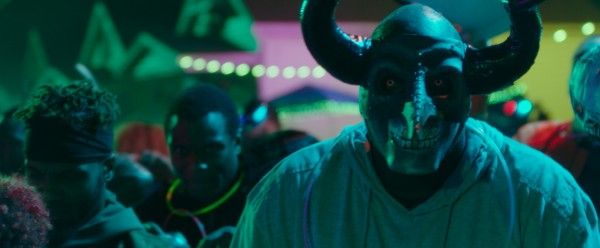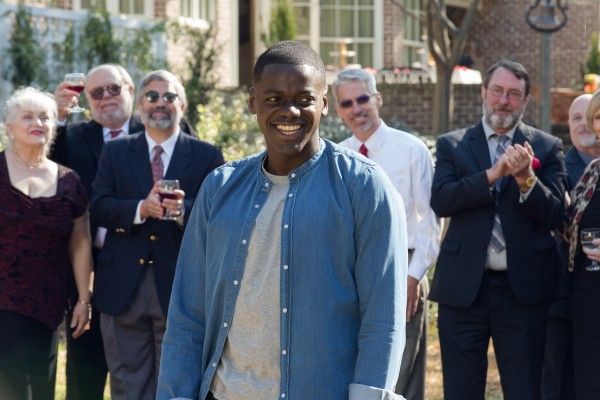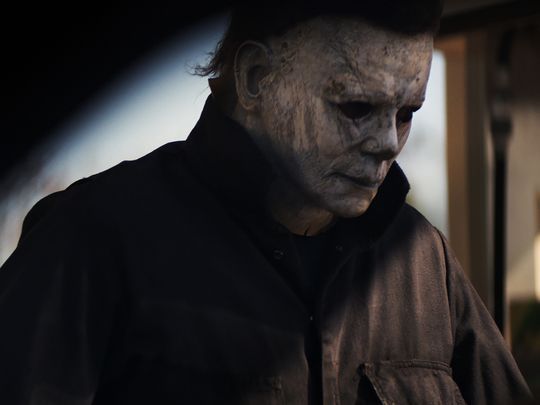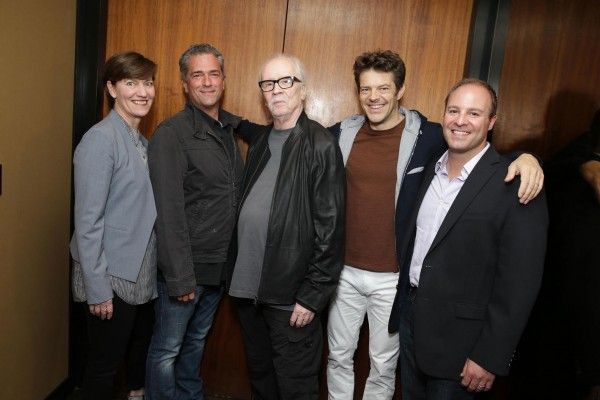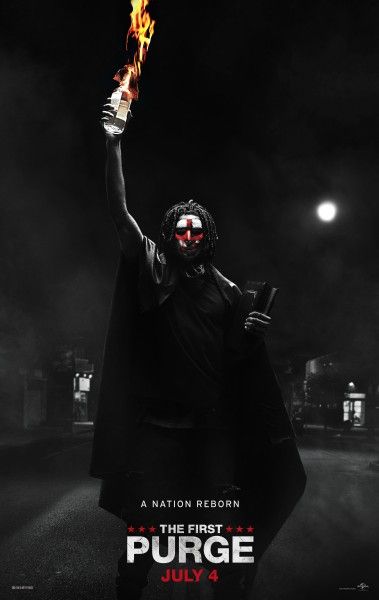Horror movies are having quite the moment and that means Blumhouse is having quite the moment too. After all, the studio behind micro-budget franchises like Insidious and The Purge has made a killing in recent years by leaning into the genre. It all culminated in one major year in 2017, with a host of box office hits including Split and Happy Death Day, not to mention Get Out, which took them all the way to the Oscars (and won for Best Original Screenplay). This year, Blumhouse has delivered new installments in their crown jewel franchises with Insidious: The Last Key and The First Purge, but the biggest is still to come with their hugely-anticipated Halloween reboot just around the corner.
With Halloween arriving in theaters this month and The First Purge now available on Blu-ray and DVD, I recently hopped on the phone for a quick one-on-one chat with Blum to discuss his 2018 films and what's happening in horror. We talked about the possibility of scaling The Purge back to the contained roots of the first film, the studio's relationship with franchise creator James DeMonaco, and how things changed at Blumhouse after their landmark year in 2017. We also discussed deciding how hard to take Halloween's R-rating, why he knew it was time to bring back the slasher franchise, and more.
Over the course of four films, the Purge franchise has increasingly become a story about class and race, and one that's grown significantly in scope. Do you see room in the future of the franchise to return to something like the more contained story we saw in the first film?
JASON BLUM: Oh, anything's possible. I think it's unlikely, I feel like we did that and I feel like people still wanted to see what the purge was, what was happening outside of the house, so it's unlikely but not impossible, how 'bout that?
Okay, I'll take it. So, this was the first Purge move that DeMonaco didn't direct, although he was obviously still very involved. And you've been very clear about your commitment to remaining with filmmakers for the sequels, can you talk about how that relationship is evolving as he works on other projects and The Purge franchise continues to grow?
BLUM: Yeah, I mean, I think in an ideal world the writer, directors would continue to write and direct in an almost ideal world, at least they write, you know? And like Leigh Whannell still writes the Insidious movies and James is still writing The Purge movies, I think if we were to do another one I think it would be very tough to have anyone write it. So I really like to have the people who create the movies that turn into franchises to be as involved as possible. Sometimes their schedule just stops permitting it or they just had enough. So I push for as much as I can get. But I still got a lot of James's focus and attention on the movies, which is great, and the TV show.
We just did this other movie that James wrote and directed, which had nothing to do with The Purge and that was something that he really wanted to do. So the other thing that I do like to do is if we have someone who's created a franchise for us, I like to support them in their other endeavors as well. So they don't feel like they're in jail, in franchise jail.
With a franchise that's as popular and successful as The Purge though, do you rule out the possibility of sequels without him down the line?
BLUM: Do I rule out the possibility? If it was without him in any way, I would rule that out. He's got to be involved in some way.
Your studio had a sort of monumental year in 2017, not just at the box office with Split, and Get Out, and Happy Death Day, but you also got a lot of awards attention, which horror never gets. In the aftermath of that, how much does that level of success in one year actually change your day-to-day operations?
BLUM: It really doesn't change it at all. I mean, I think we get a higher level of submission. So I think we're seeing better material. It changes how people look at us. But it doesn't change how we react. It changes the incoming business, but it doesn't change the outgoing business. That's the way I would say it. We're still... I'm not particularly interested in doing bigger budget movies, I'm not particularly interested in chasing Oscar movies. One of the reasons we've been able to kind of continue to be successful is that I really love the kind of area that we plan on the feature side and I'm very happy with it, I'm not doing it to get somewhere else. And so, we're going to continue to do that, whether we have successful years or less successful years.
Now, that doesn't mean we're doing the same thing this year than we're doing two years ago, it has to evolve. But it evolves in small ways, not big course-changing ways.
While we’re talking about evolution, I remember visiting the set of Insidious 2, all those years ago.
BLUM: Oh my God!
Yes! And that was still micro, micro-budget indie. How much has your day to day evolved in the years since then?
BLUM: My day-to-day is actually quite different. I spend a lot of time in television now, when we were doing Insidious Two, it was only a movie company. So I'd say that's the biggest way that my day to day has changed. It's about 50/50, TV to movies. The staff is bigger, so I probably spend a little more time on internal issues and on internal phone calls and meetings than I used to then. So that's different. I mean I definitely, it definitely feels like I'm managing ... with Insidious 2 it was still pretty mom and pop. It's still mom and pop, but it's a lot less mom and pop than it was.
2017 wasn't just a huge year for you guys, it was a huge year for horror in general. And 2018 has really continued that trend— even looking forward this year, we have Halloween and Suspiria, these two iconic titles within weeks of each other. So when you see a landscape that's that densely populated with horror hits, what's your take on it? Do you see it as a rising tide, lifts all boats scenario or does the competition force you to reconsider your marketing strategies?
BLUM: Well, I think what we recently happened with horror is that you get a few good years and then you get too many horror movies and then you get a few bad years, I've lived through a couple of those cycles. And I think we're gonna see that again next year you're gonna see just too much, the market can only support so much. I think you're gonna see a lot more and for us, I guess you gotta like that 'cause usually when there's a lot of it, the cream rises to the top — a lot of it goes by the wayside, the quality goes down. So that keeps us on our toes, keeps us competitive. But I do think you're gonna ... will see a lot of movies that are cheesy and a bunch of them won't do that well. And then it'll contract again. That's usually what happens.
When it came to Halloween’s R-rating, how much finessing did you guys have to do in the edit to decide what's the right level of violence for a modern audience?
BLUM: We did a lot of finessing on the movie just generally, not necessary about violence. I always think, that kinda less violence you show the scarier it is. But you can't get away with not showing violence in Halloween in my opinion. So it is there, and when it's there it's very violent. Also, if it's violent all the way through you kinda become numb to it, so we kinda pick and chose our moments. And we went for it on those moments and I think it's pretty effective. Hopefully other people will too. But we finesse all of it, we screen it for audience and futz, and go back and forth. We work on them, I'm sure like everybody else, but I feel like we're always finessing. Violence is one scare that I think we probably finesse the most, the thing we tangle with the most probably.
Halloween seems like one of the rare films in your studio that didn't come from a director pitch, but from an IP. So what made you confident that it was the right time for a new Halloween movie, especially when slashers have been struggling for so long?
BLUM: Well, I definitely, yeah. I guess what made me confident, gosh, yeah... there's so much. Every time you put anything out about Halloween on social media people go [nuts]. The reaction is like so much bigger than anything and any other title that we've ever put out there, including titles that we're in the middle of franchises on. So that to me, really indicated that there was a passion and desire for a good quality Halloween movie. I'm sure you know Ryan Turek, who's the biggest Halloween fan of all time, who has about three Halloween tattoos and he works at the company, and he was a big and very vocal supporter of saying, "Now's the time for Halloween." I really trust him in that. Soon as we started it was clear we made the right choice, people were very... they were either angry or they're angry or they're happy but they're vocal, which always says tune in 'cause you're on to something.


